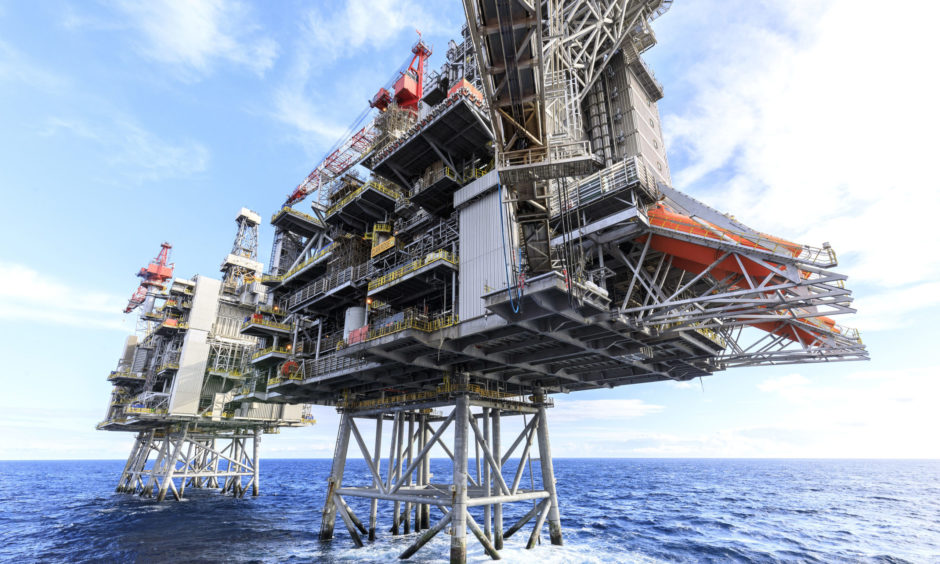Scottish Conservative leader Douglas Ross will argue today that protecting oil and gas jobs should be prioritised over climate change targets.
The Moray MP will warn that “too much focus” has been put on managing the decline of the North Sea, and not enough on ensuring its survival for decades to come.
The remarks, due to be made from Aberdeen in an online speech to more than 100 industry workers, will prove controversial with supporters of an accelerated transition away from fossil fuels.
In his speech, Mr Ross will also call for the Scottish and UK governments to work more closely together on their strategy and policy towards the North Sea.
The Tory leader wants the two administrations to establish a “North Sea Ministerial Working Group”, and to join forces on a “North Sea Transition Deal”, matching each other’s funding commitments.
And he will suggest an exemption to allow oil and gas workers to be tested for Covid-19 while offshore, if they have been alerted by the track and trace system of coming into contact with someone who had the virus.
My party will not throw away oil and gas jobs to achieve climate goals.”
Douglas Ross
In his first major intervention on oil and gas policy since becoming Scottish Conservative leader, Mr Ross will say: “It’s right that we push to expand the renewables sector, we all want to meet our climate change commitments and achieve the net zero target by 2045.
“But there is far too much focus on managing the decline of the oil and gas industry.
“We need to prepare for the future but the priority for me is the 100,000 jobs in the sector right now.
“My party will not throw away oil and gas jobs to achieve climate goals.
“We need our North Sea oil and gas sector to survive for decades, not for years.
“So I will be arguing that both of Scotland’s governments need to find new ways to work together on a more positive, bright future for the industry.”
‘Ensure both governments are doing all they can to protect jobs and retain vital skills’
Scotland’s Energy Minister, Paul Wheelhouse, said: “The oil and gas industry is a significant component of our economy and Scotland’s Energy Strategy already identifies a crucial role for the sector in the energy transition required to move to an economy and society that generates net zero greenhouse gas emissions. Now, more than ever, we need a just transition that supports sustainable economic growth and jobs.
“We know how important a sustainable future is for those who work in the sector and its supply chain. This has been the focus of the work of the Oil and Gas and Energy Transition Strategic Leadership Group that I chair, which has met seven times since April. Our £62 million Energy Transition Fund, announced ahead of the UK Government’s deliberations, arose from those meetings and meets the industry’s asks of us. The fund helps protect existing jobs as well as create new employment across Scotland by opening up opportunities through energy transition and harnessing private sector funding as companies move from oil and gas to low carbon and renewable investments.
“It is anticipated that the fund will help lever in an overall funding package in excess of £900 million. In addition, in the context of the current Covid-19 pandemic, our Strategic Leadership Group has worked to identify support for the sector, including opportunities in workforce retention, skills and training, drawing upon the efforts of Oil and Gas UK’s Steering Group and the OGA’s Supply Chain Taskforce.
“Public Health Scotland does not currently recommend testing of asymptotic workers prior to travel offshore because the 14-day incubation period would not remove the risk of people incubating the disease whilst becoming symptomatic while offshore.
“We continue to work closely with the UK Government, which retains many of the key levers needed to support the sector, to ensure both governments are doing all they can to protect jobs and retain vital skills. We support the industry’s Roadmap 2035, and delivery of a North Sea Transition Deal, that will complement our Energy Transition Fund to support common projects and decarbonise the remaining production in the North Sea as part of a sustainable, secure and inclusive energy transition.”



